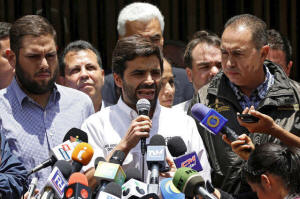|
Venezuela's Maduro calms court row after
critics condemn 'coup'
 Send a link to a friend
Send a link to a friend
 [April 01, 2017]
By Girish Gupta and Andrew Cawthorne [April 01, 2017]
By Girish Gupta and Andrew Cawthorne
CARACAS (Reuters) - Venezuelan authorities
called on the country's Supreme Court to review its decision this week
to annul the opposition-led congress, which critics have decried as a
"coup" and a lurch to dictatorship.
President Nicolas Maduro said in a midnight address on state television
that the conflict between the Supreme Court and National Assembly had
been overcome, but gave no details.
Maduro, flanked by senior officials, introduced his Vice President
Tareck El Aissami who said:
"(We) urge the Supreme Court to review the decisions ... in order to
maintain institutional stability and the balance of powers."
Having already shot down most of the National Assembly's measures since
the opposition won control in 2015, the pro-Maduro Supreme Court on
Wednesday said it was taking over the legislature's role because it was
in "contempt" of the law.
The court's move to assume Congress' responsibilities has sparked
international condemnation and protests across Caracas.

In a rare show of dissent from a senior official, Venezuela's powerful
attorney general Luisa Ortega, long an ally of Maduro, rebuked the court
on Friday.
"It constitutes a rupture of the constitutional order," the 59-year-old
said in a speech on state television. "It's my obligation to express my
great concern to the country."
The pro-Maduro Supreme Court said on Wednesday it was taking over the
legislature's role because it was in "contempt" of the law. It has shot
down most of the National Assembly's measures since the opposition won
control in 2015.
PROTESTS, CONDEMNATION
Venezuelan National Assembly president Freddy Guevara said on Twitter
that the "coup" was unacceptable to the people and joined calls for
protests on Saturday morning.
A few dozen protesters, waving banners saying "no to dictatorship", had
clashed with police across Caracas on Friday.
However, after years of failure on the streets, it is unlikely public
protests will develop into the wave of anti-Maduro unrest seen in 2014.
Maduro, 54, a former bus driver and self-declared "son" of late leftist
predecessor Hugo Chavez, was narrowly elected president in 2013.
[to top of second column] |

Juan Andres Mejia, deputy of Venezuelan coalition of opposition
parties (MUD), talks to the media outside the offices of the
opposition party Justice First (Primero Justicia), next to his
fellow deputies Juan Requesens (L) and Richard Blanco (R) in
Caracas, Venezuela March 31, 2017. REUTERS/Carlos Garcia Rawlins

But his ratings have plummeted as Venezuelans struggle with a fourth
year of recession, scarcities of food and medicines and what is
thought to be the world's highest inflation.
Critics blame a failing socialist system, whereas the government
says its enemies are waging an "economic war". The fall in oil
prices since mid-2014 has exacerbated the crisis.
The Supreme Court's power grab also brought condemnations and
concern from the United States, Organization of American States
(OAS), European Union, United Nations and major Latin American
nations.
Ally Russia bucked the trend, urging the world to leave Venezuela
alone.
Maduro accuses Washington of leading a push to topple him as part of
a wider offensive against leftists in Latin America.
OAS head Luis Almagro, whom the Venezuelan government views as a
pawn of Washington, has been pushing for its suspension from the
34-nation regional bloc, which has announced an extraordinary
meeting for Monday to debate Venezuela.
(Additional reporting by Diego Ore and Deisy Buitrago in Caracas;
Editing by Kim Coghill and Alexander Smith)
[© 2017 Thomson Reuters. All rights
reserved.]
Copyright 2017 Reuters. All rights reserved. This material may not be published,
broadcast, rewritten or redistributed.
 |